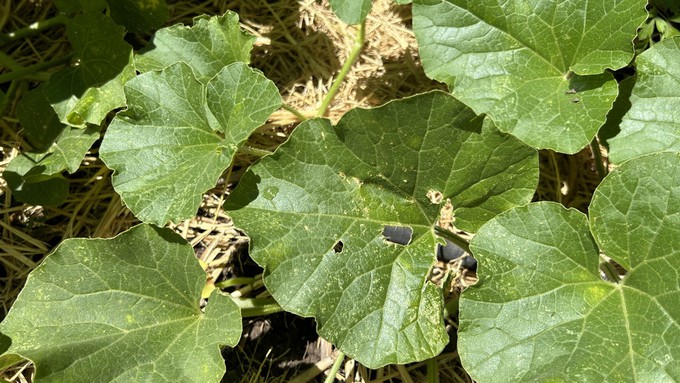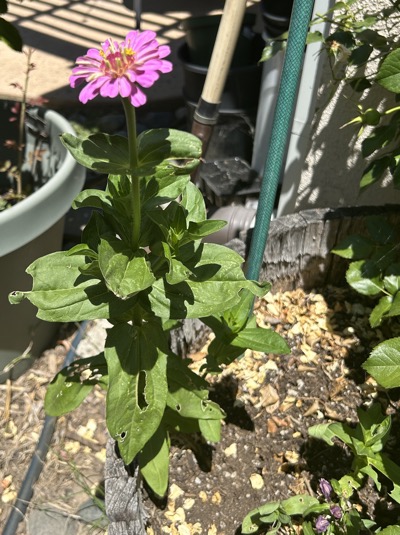
Healthy is better and it's less stressful, too

Yes, there are some holes in those melon leaves. Am I worried? No -- I'm not growing melons for their leaves. Kathy Morrison
Perfection is over-rated. It's also tough on the garden, on wildlife -- and on the gardener.
Experienced gardeners know this. We're used to the holes punched in rose foliage by leafcutter bees. We don't fly into a frenzy when the sunflower leaves are pecked by lesser goldfinches. And we know that the water spots or ragged edges or sunburn or slightly curled leaves are part of what happens as the weather changes and the plants adjust.
There is no perfection in nature, but newbie gardeners or obsessives keep trying to achieve -- or worse, maintain -- that magazine-perfect look in their backyard gardens.
Sacramento has been spoiled this year, I admit, by the mild weather through the spring. The plants look happier than ever, unstressed so far by extreme heat. My tomato plants especially are gorgeous, full of developing fruit.
I did not achieve that by spraying them with insecticide every day.
Yes, there is a gardener out there in the Sacramento area who sprays "insect killing soap" on his plants TWICE A DAY; he posted that on a Facebook gardening group that I'm a (mostly lurking) member of. This boggles the mind; never mind the fact that the package itself says "apply every 5-7 days as long as insects are present." There can't be a flying or crawling critter within half a mile of his garden by now. And he has a broad-spectrum insecticide as a "backup." Ay-yi-yi.
(By the way, spraying an infested plant with water is an excellent way to battle aphids, whiteflies, spider mites and powdery mildew. Just water.)
That same social media group has some members who fuss over every slight imperfection on leaves, who water twice a day "just in case" then wonder why a plant's leaves turn yellow, or who worry that their vegetable plants are dropping some flowers unpollinated. (It's biology, people, think about it.)

I wish more gardeners would turn to the UC Integrated Pest Management website first, for science-based solutions, before throwing a problem out on social media. ("Pest" in IPM refers to plant diseases or weeds as well as insect pests.) The California Master Gardener's Handbook sums up the approach: "A fundamental concept of IPM is that a limited amount of pest damage to plants can be tolerated."
Now, big problems should be addressed and quickly: A tomato plant that collapses overnight, for instance, or a tree that's losing its bark. In those cases, check with experts (master gardeners or arborists recommended) about diagnosis and remedy. Most instances of online "crowd diagnosis" include some really bad advice along with the good.
So back off, gardeners. If the plant is generally healthy, if you did enough prep work before planting, if you have flowers and bees and a decent irrigation setup, the garden will do well enough this summer. Slow down, stop stressing and ENJOY that garden, ragged leaves and all.
Comments
0 comments have been posted.Sacramento Digs Gardening to your inbox.
Sites We Like
Garden Checklist for week of May 12
Get your gardening chores and irrigation done early in the day before temperatures rise.
* Plant, plant, plant! It’s prime planting season in the Sacramento area. Time to set out those tomato transplants along with peppers and eggplants. Pinch off any flowers on new transplants to make them concentrate on establishing roots instead of setting premature fruit.
* Direct-seed melons, cucumbers, summer squash, corn, radishes, pumpkins and annual herbs such as basil.
* Harvest cabbage, lettuce, peas and green onions. This heat will cause leafy greens and onions to flower; pick them before they bolt.
* In the flower garden, direct-seed sunflowers, cosmos, salvia, zinnias, marigolds, celosia and asters.
* Plant dahlia tubers. Other perennials to set out include verbena, coreopsis, coneflower and astilbe.
* Transplant petunias, marigolds and perennial flowers such as astilbe, columbine, coneflowers, coreopsis, dahlias, rudbeckia and verbena.
* Keep an eye out for slugs, snails, earwigs and aphids that want to dine on tender new growth.
* Feed summer bloomers with a balanced fertilizer.
* For continued bloom, cut off spent flowers on roses as well as other flowering plants.
* Got fruit trees? If you haven't already done so, thin orchard fruit such as apples, peaches, pears, pluots and plums before they grow too heavy, breaking branches or even splitting the tree. Leave the largest fruit on the branch, culling the smaller ones, and allow for 5 to 6 inches (or a hand's worth) between each fruit.
* Thin grape bunches, again leaving about 6 inches between them. For the remaining bunches, prune off the "tail" end, about the bottom third of the bunch, so that the plant's energy is concentrated in the fruit closest to the branch.
* As spring-flowering shrubs finish blooming, give them a little pruning to shape them, removing old and dead wood. Lightly trim azaleas, fuchsias and marguerites for bushier plants.
* Add mulch to the garden to help keep that precious water from evaporating. Mulch also cuts down on weeds. But don’t let it mound around the stems or trunks of trees or shrubs. Leave about a 6-inch to 1-foot circle to avoid crown rot or other problems.